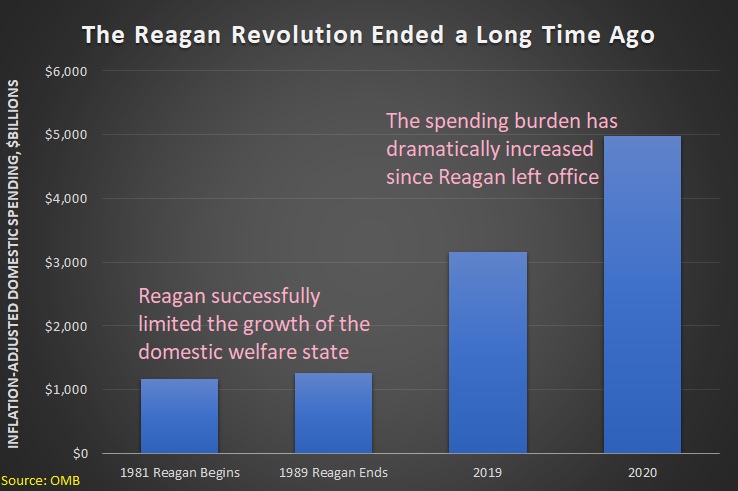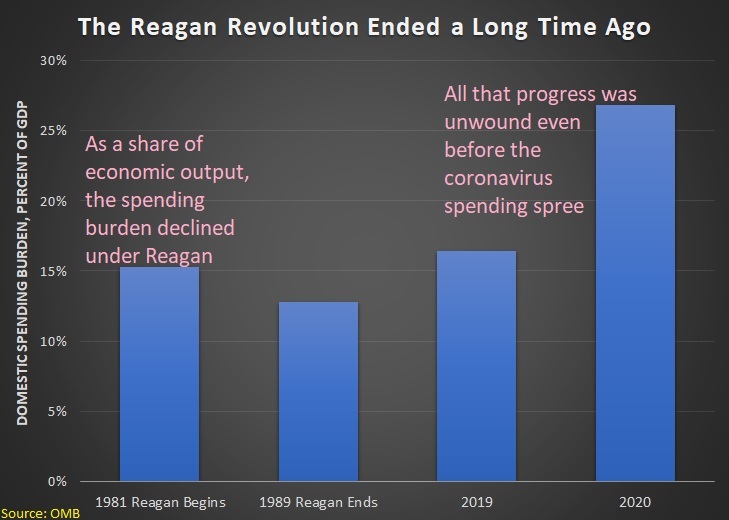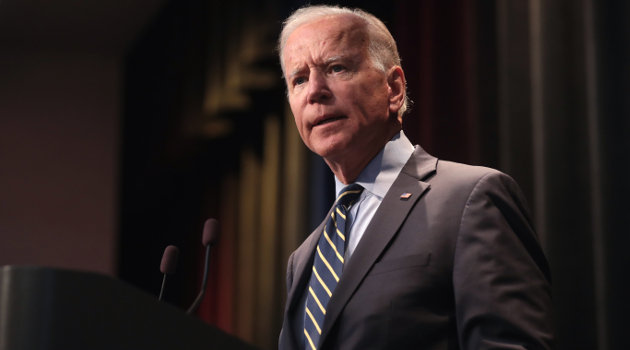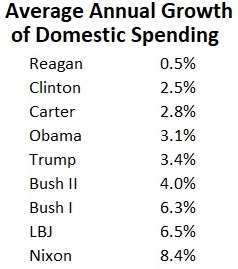With regards to fiscal policy, part of my mission is to proselytize in favor of lower tax rates and a smaller burden of government spending.
But another goal is simply to make sure people understand basic facts about the budget.
For instance, how many people know that Republican presidents (notwithstanding their rhetoric) generally increase spending at a faster rate than Democrats?
Not many.
And even fewer people know that Republican presidents even increase domestic spending (discretionary outlays plus entitlements) faster than Democrats.
The only exception to this rule is Ronald Reagan.
Which explains why folks on the left don’t like him, which is a perfectly reasonable reaction from their perspective.
But what’s not reasonable is the way some of them butcher facts in pursuit a big-government agenda.
For instance, Paul Waldman of the Washington Post has a column claiming that Joe Biden is finally, after 40 years, ending the Reagan revolution.
…the old-school plutocrats who have long controlled the party’s policy agenda…are getting very frightened of the reconciliation bill Democrats are negotiating. …The reconciliation bill really does represent an undoing of Reaganism. …The bill would reverse what Ronald Reagan wrought on government spending… Reagan famously said that “government is not the solution to our problem; government is the problem.” His great achievement was to make that the default assumption of public debate, the paradigm under which the country would operate for decades. It held sway even during periods of Democratic rule. Bill Clinton embraced the Reagan paradigm… the Democratic reconciliation bill is most revolutionary. It would reinforce the safety net — largely temporary programs such as unemployment insurance and food stamps, meant to help when you experience a crisis — but it would also create a new system of social infrastructure… All of which would go far beyond what was in place before Reagan. …it really is a threat to the legacy of Reaganism.
Some of what Waldman wrote is correct.
Reagan did point out that “government is the problem.”
And we did get a bit of Reagan-style spending restraint under Bill Clinton (though one can certainly argue that the post-1994 GOP Congress deserves some or all of the credit).
But he is wildly wrong in his main point about a dominant Reagan-inspired paradigm on government spending.
Let’s go to the Historical Tables of the Budget, published by the Office of Management and Budget.
Here’s a chart based on Table 8.2, which shows total domestic spending (column E + column H) in inflation-adjusted dollars. As you can see, outlays have exploded in the post-Reagan years (and I included both 2019 and 2020 data to show that it’s not just the coronavirus-related spending increases from last year).

Now let’s look at Table 8.4, which allows us to show domestic spending (also column E + column H) as a share of economic output.
We see that the burden of such outlays declined significantly under Reagan. Sadly, all that progress evaporated (and then some) by 2019.

The bottom line is that Biden does have a big-government agenda.
But that’s not exactly a new paradigm. Every other president in the post-Reagan era has sided with government over taxpayers.
I miss the Gipper.
———
Image credit: Gage Skidmore | CC BY-SA 2.0.



